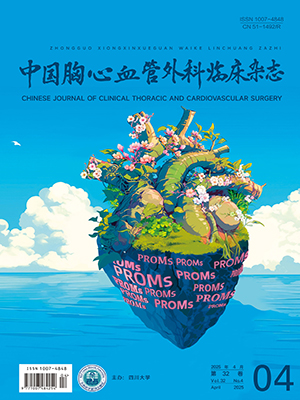| 1. |
Dagenais F, Moront MG, Brown WM, et al. Safety, efficacy, and hemodynamic performance of a stented bovine pericardial aortic valve bioprosthesis: Two-year analysis. J Thorac Cardiovasc Surg, 2020, 160(2): 371-381.
|
| 2. |
Klautz RJM, Dagenais F, Reardon MJ, et al. Surgical aortic valve replacement with a stented pericardial bioprosthesis: 5-year outcomes. Eur J Cardiothorac Surg, 2022, 62(3): ezac374.
|
| 3. |
Okita Y, Fujita T, Zaikokuji K, et al. Two-year results of the 17-mm avalus aortic valve in the PERIGON Japan trial. Circ J, 2021, 85(7): 1035-1041.
|
| 4. |
Kiaii BB, Moront MG, Patel HJ, et al. Outcomes of surgical bioprosthetic aortic valve replacement in patients aged ≤65 and >65 years. Ann Thorac Surg, 2022, S0003-4975(22): 00062-5.
|
| 5. |
Vahanian A, Beyersdorf F, Praz F, et al. 2021 ESC/EACTS guidelines for the management of valvular heart disease. Eur Heart J, 2022, 43(7): 561-632.
|
| 6. |
Writing Committee, Otto CM, Nishimura RA, et al. 2020 ACC/AHA guideline for the management of patients with valvular heart disease: A report of the American College of Cardiology/American Heart Association Joint Committee on Clinical Practice Guidelines. J Am Coll Cardiol, 2021, 77(4): e25-e197.
|
| 7. |
Yongue C, Lopez DC, Soltesz EG, et al. Durability and performance of 2298 trifecta aortic valve prostheses: A propensity-matched analysis. Ann Thorac Surg, 2021, 111(4): 1198-1205.
|
| 8. |
Bavaria JE, Griffith B, Heimansohn DA, et al. Five-year outcomes of the COMMENCE trial investigating aortic valve replacement with RESILIA tissue. Ann Thorac Surg, 2022, S0003-4975(22): 00063-7.
|
| 9. |
Freitas-Ferraz AB, Tirado-Conte G, Dagenais F, et al. Aortic stenosis and small aortic annulus. Circulation, 2019, 139(23): 2685-2702.
|
| 10. |
Ohira S, Miyata H, Doi K, et al. Risk model of aortic valve replacement after cardiovascular surgery based on a National Japanese Database. Eur J Cardiothorac Surg, 2017, 51(2): 347-353.
|
| 11. |
Rodés-Cabau J, Pibarot P, Suri RM, et al. Impact of aortic annulus size on valve hemodynamics and clinical outcomes after transcatheter and surgical aortic valve replacement: Insights from the PARTNER Trial. Circ Cardiovasc Interv, 2014, 7(5): 701-711.
|
| 12. |
Okamoto Y, Yamamoto K, Sugimoto T, et al. Early and late outcomes of aortic valve replacement with aortic annular enlargement: A propensity analysis. Thorac Cardiovasc Surg, 2016, 64(5): 410-417.
|
| 13. |
Celiento M, Ravenni G, Tomei L, et al. Excellent durability of the mosaic porcine aortic bioprosthesis at extended follow up. J Heart Valve Dis, 2018, 27(1): 97-103.
|
| 14. |
张永会, 姜胜利, 张林, 等. 右胸肋间、胸骨上段与胸骨正中切口主动脉瓣置换术比较. 中华胸心血管外科杂志, 2019, 35(2): 94-98.
|
| 15. |
Zallé I, Son M, El-Alaoui M, et al. Minimally invasive and full sternotomy in aortic valve replacement: A comparative early operative outcomes. Pan Afr Med J, 2021, 40: 68.
|
| 16. |
Carroll JD, Mack MJ, Vemulapalli S, et al. STS-ACC TVT registry of transcatheter aortic valve replacement. J Am Coll Cardiol, 2020, 76(21): 2492-2516.
|
| 17. |
Abdelghani M, Landt M, Traboulsi H, et al. Coronary access after TAVR with a self-expanding bioprosthesis: Insights from computed tomography. JACC Cardiovasc Interv, 2020, 13(6): 709-722.
|
| 18. |
Ochiai T, Chakravarty T, Yoon SH, et al. Coronary access after TAVR. JACC Cardiovasc Interv, 2020, 13(6): 693-705.
|
| 19. |
De Backer O, Landes U, Fuchs A, et al. Coronary access after TAVR-in-TAVR as evaluated by multidetector computed tomography. JACC Cardiovasc Interv, 2020, 13(21): 2528-2538.
|
| 20. |
Mack MJ, Leon MB, Thourani VH, et al. Transcatheter aortic-valve replacement with a balloon-expandable valve in low-risk patients. N Engl J Med, 2019, 380(18): 1695-1705.
|
| 21. |
Popma JJ, Deeb GM, Yakubov SJ, et al. Transcatheter aortic-valve replacement with a self-expanding valve in low-risk patients. N Engl J Med, 2019, 380(18): 1706-1715.
|




